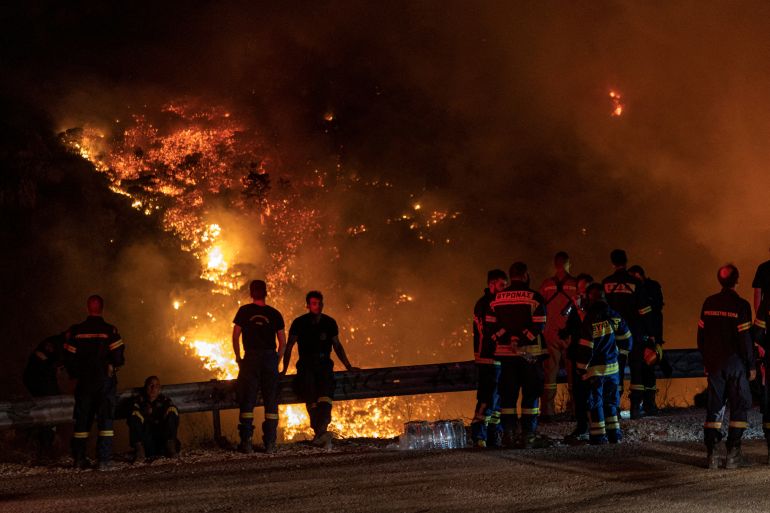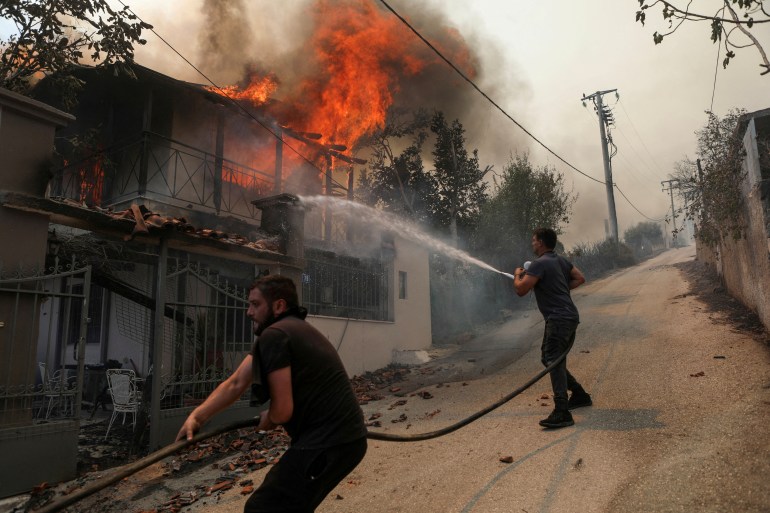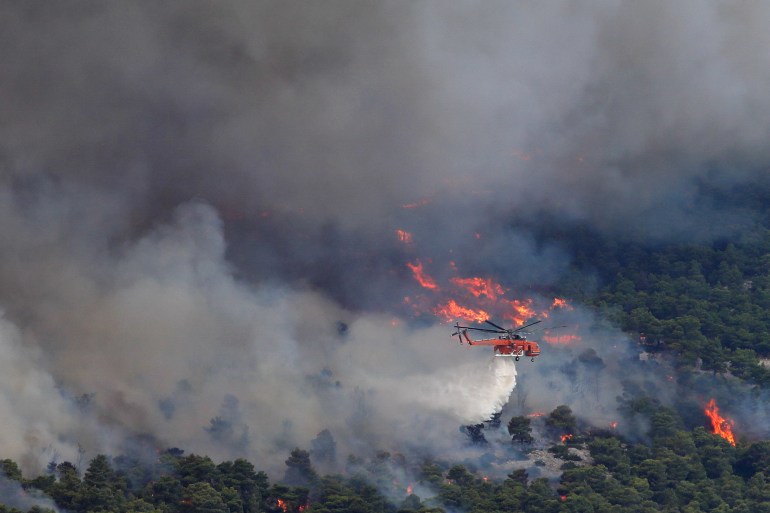Deaths in Greece wildfires highlight the plight of asylum seekers
Firefighters find 18 burned bodies in Dadia Forest, suspected to be asylum seekers, as wildfires ravage northern Greece.

Athens, Greece – The discovery of 18 bodies in the Greek wildfires – thought to be asylum seekers – has prompted new discussion around the plight of those on the move in the country.
Greek authorities found the remains of 18 people in the national forest of Dadia on Tuesday, in the northeastern Greek region of Evros where the blaze is still raging.
Keep reading
list of 3 itemsFirefighters in Greece struggle to contain wildfire near Athens
Photos: Flames devour forests and homes in Greece
The group, reportedly made up of two children and 16 adults, was likely trying to flee from the flames, according to the local coroner Pavlos Pavlidis, who said the children were between 10 and 15 years old.
It was separately reported that the body of a man was found on Monday also presumed to be an asylum seeker.
Locals have had to abandon homes and livelihoods to escape the fires as villages and even the main hospital in Alexandroupoli, the region’s capital, were evacuated.

The Evros region shares a land border with Turkey and lies along a well-trodden route for asylum seekers crossing into Europe from Turkey.
The area is highly monitored by Greek authorities and there have been ongoing reports of illegal and brutal pushbacks of asylum seekers, which authorities adamantly deny.
Some people who used this route, which consists of swathes of forests, have previously described to Al Jazeera how they have hidden to avoid detection.
Alarm Phone, an emergency hotline frequently contacted by people on the move in distress, told Al Jazeera they had been in contact with a number of groups of people in the region in recent days who described being threatened by the flames, but said were equally afraid of being pushed back over the border.
Alarm Phone said the area was essentially a “no-man’s land” for asylum seekers.
The Greek Ministry of Migration and Asylum expressed “great sadness” on the news of the deaths, but added that “despite the constant and persistent efforts of the Greek authorities to protect the borders and human life, this tragedy confirms, once again, the dangers of irregular immigration”, and denounced “the murderous activity of criminal traffickers”.

The Civil Protection Ministry also expressed condolences, but added “the unfortunate foreigners, while they were forbidden to be in the forest … and despite multiple 112 messages to Greeks and foreigners in the area, did not leave”.
It is not known if the group had working mobile phones, understood the language of the messages or knew it was forbidden to be in the forest.
Two Greeks and one Albanian were arrested on Tuesday after posting a video online of a group of people presumed to be asylum seekers locked in a trailer.
In the video, the man accused migrants of having started the fires but offered no evidence and none has emerged that this is the case.
Conspiracy theories
The Border Violence Monitoring Network (BVMN), a coalition of more than 14 organisations, in a statement with Lena Karamanidou, a noted researcher on Evros, pointed to far-right galvanisation around conspiracy theories that migrants were responsible for the fires.
They said that figures such as Kyriakos Velopoulos, a member of parliament and leader of the far-right party Hellenic Solution had shared the video of the people locked in the trailer.
“Yet again, a tragic situation has been manipulated to blame people on the move themselves for their own deaths, and to strengthen links between migration and criminality that has led to the proliferation of mobilised right-wing groups in the region,” the BVMN said, criticising the response of some Greek authorities.
“Greece’s intense focus on migration has come at the cost of its land and its citizens, with tens of millions of euros poured into high-tech Closed Controlled Access Centres and the Automated Border Surveillance Systems used to ‘prevent entry’ of 2,170 undocumented persons between the 14th and 17th of August, and arrest 29 alleged human traffickers,” they said.
“Yet, there were few fire-preparedness measures taken for the wildfires that everyone knew were coming, and that have destroyed Greece’s natural landscape and razed homes and livelihoods to the ground,” BVMN added.
Eftychia Georgiadi, International Rescue Committee’s head of programmes in Greece, told Al Jazeera it was “devastating that at least 18 people have needlessly lost their lives”.
“Nobody should be forced to seek shelter in the forest and left without adequate protection,” Georgiadi said.
She said – once confirmed – the deaths “demonstrate the deadly consequences of the EU’s failure to agree on a humane, sustainable asylum system”.
“This lack of coordinated action leaves people exposed to grave dangers at every step of their journeys in search of protection in Europe,” Georgiadi said, adding it was vital “the EU and its member states uphold the fundamental right to apply for asylum, and create more safe routes so that fewer people are left with no option but to risk their lives on such dangerous journeys”.
‘Invisible’
Alarm Phone told Al Jazeera that asylum seekers moving through the region had become “invisible”, and sent a list of the groups they had lost contact with in recent days as well as a catalogue of reports of pushbacks and violence in the area.
“Nobody implied that foreigners set the fires on Rhodes one month ago,” they said, “state mechanisms – not just Greek – did everything to evacuate tourists”, and highlighted the difference between how international media focussed heavily on tourists impacted by the fires on Rhodes earlier this summer compared to the muted response now.
The group told Al Jazeera that climate change added an extra layer of violence to the lives and treatment of those on the move.
“The comparison between how foreigners are treated during disasters in Greece shows that the right to life is arbitrarily determined based on racist and colonial socioeconomic standards.”